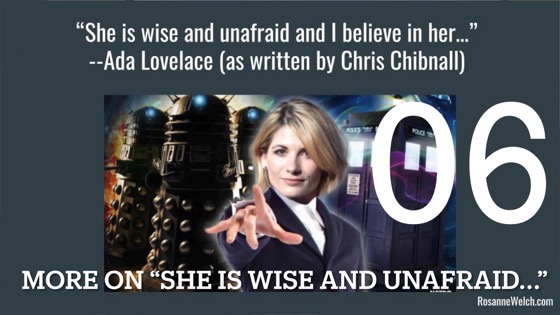Many thanks to Janice Law of the American Women Writers National Museum who invited me to give a short talk on The Women of Early TV.
I enjoyed sharing the names and careers of women like Peg Lynch, Gertrude Berg, Selma Diamond, and D.C. Fontana to the members who gathered on Zoom last Wednesday morning. There are so many more I could have talked about whose names don’t appear in mainstream books about the history of television so we have to learn who they are and carry those names forward ourselves. It’s one of the missions of the Stephens College MFA in TV and Screenwriting – and has been one of my missions all my life.

Transcript:
That particular season The Emmys also gave an overall Emmy for best writer of the whole year and Treva won that. So she’s the only person to win two Emmys in one year. Happens to be a female who worked alone right which I love. Now before that she worked on – she did a couple episodes of That Girl and I simply want to mention that because we often say Mary Tyler Moore was the first single woman on television. She was not. Actually, That Girl was because she was an actress but we don’t take that job seriously but she was the first show. She came on two seasons before Mary Tyler Moore and even before that we should say that Julia was the first working woman on television right and that’s an early just before Mary Tyler Moore as well. So we have a few things to think about in terms of Treva Silverman. After she did television she did script doctoring. So we don’t see her name come up very often because she’s someone that would be hired — in this case for this movie Romancing The Stone — to fix it right? There’s something wrong. We want to make this movie but it’s not working. In this case, the adorable thing was the Kathleen Turner character everyone thought was too harsh and what can we do to soften her up without giving her, you know, a boyfriend or whatever because she’s going to end up you know with Michael Douglas and Treva’s idea was the idea that has spawned a series of books on how to write film and that’s called Save The Cat. She brought in a cat. She wrote an early scene where Kathleen Turner was feeding her cat and because she loved a pet the audience loved her and that salvaged the character. So that’s the kind of script doctoring that she would do pretty much for the rest of her career.
Many thanks to Janice Law of the American Women Writers National Museum who invited me to give a short talk on The Women of Early TV.
I enjoyed sharing the names and careers of women like Peg Lynch, Gertrude Berg, Selma Diamond, and D.C. Fontana to the members who gathered on Zoom last Wednesday morning. There are so many more I could have talked about whose names don’t appear in mainstream books about the history of television so we have to learn who they are and carry those names forward ourselves. It’s one of the missions of the Stephens College MFA in TV and Screenwriting – and has been one of my missions all my life.
Watch this entire presentation
Women pioneers who created, produced, or shepherded many of America’s most wildly popular, early television programs will be profiled by Dr. Rosanne Welch.
Podcast: Play in new window | Download
Subscribe: RSS
![17 Even More On Treva Silverman From Women in Early TV for the American Women Writers National Museum [Video]](https://rosannewelch.com/wp-content/uploads/2022/03/rmw-visible-stars-early-tv-17.jpg)

![08 More On Chibnall's Earlier Writing...from The Difficulties and Delicacies of Writing the First Female Doctor in 50+ years [Video] [Doctor Who]](https://rosannewelch.com/wp-content/uploads/2022/03/rmw-whocon-2021-chibnall-08.jpg)
![42 More On Characters...from Worry and Wonder | The Courier Thirteen Podcast [Video]](https://rosannewelch.com/wp-content/uploads/2022/03/rmw-courier-13-42.jpg)
![16 More On Treva Silverman From Women in Early TV for the American Women Writers National Museum [Video]](https://rosannewelch.com/wp-content/uploads/2022/03/rmw-visible-stars-early-tv-16.jpg)
![07 Chibnall's Earlier Writing...from The Difficulties and Delicacies of Writing the First Female Doctor in 50+ years [Video] [Doctor Who]](https://rosannewelch.com/wp-content/uploads/2022/03/rmw-whocon-2021-chibnall-07.jpg)
![41 Theme and Character...from Worry and Wonder | The Courier Thirteen Podcast [Video]](https://rosannewelch.com/wp-content/uploads/2022/03/rmw-courier-13-41.jpg)
![15 Treva Silverman From Women in Early TV for the American Women Writers National Museum [Video]](https://rosannewelch.com/wp-content/uploads/2022/03/rmw-visible-stars-early-tv-15.jpg)

![40 Artist-Scholars from Worry and Wonder | The Courier Thirteen Podcast [Video]](https://rosannewelch.com/wp-content/uploads/2022/03/rmw-courier-13-40.jpg)
![14 Joan Harrison From Women in Early TV for the American Women Writers National Museum [Video]](https://rosannewelch.com/wp-content/uploads/2022/03/rmw-visible-stars-early-tv-14.jpg)